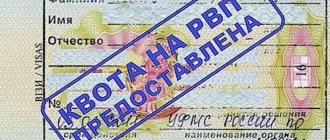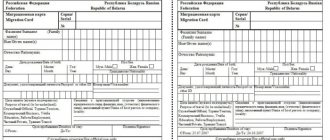What is deportation?
Within the framework of the current legislation of the Russian Federation, the term “deportation” means the expulsion of a person who has foreign citizenship, or who does not have citizenship at all, to another state on an involuntary basis.
This measure of influence belongs to the category of administrative penalties and can be carried out according to the following principles:
- on a compulsory basis;
- voluntarily.
In the first case, this procedure is quite unpleasant, since the migrant’s departure from the country is carried out under escort conditions.
Deportation from Russia
Russian Federation, then in some cases there are chances to successfully lift deportation and avoid deportation from Russia. Deportation can be lifted in the following cases:
- you have relatives who have Russian Federation citizenship and live in Russia.
- Your husband/wife is a citizen of the Russian Federation.
- your child is a citizen of the Russian Federation.
- at the time when the court made the decision on deportation, you had a work patent, work permit, residence permit or temporary residence permit issued and valid.
- you are a student at a university, institute or university.
- you are sick and undergoing treatment in a medical facility in Russia.
If you belong to the category of foreign citizens listed above, then you have every chance to cancel the deportation and stay in Russia.
How is it different from expulsion?
Despite the practically identical meaning of the expulsion and deportation procedures in relation to a migrant, there is a legal difference between them. Their fundamental difference is that in the first case, the basis for expulsion can only be a court decision, as an effective lever for regulating the processes of illegal emigration of stateless persons and foreigners.
As a rule, deportation involves the person leaving the country on his own. However, sometimes events allow for coercive measures if there is information that a person is deliberately avoiding leaving. In this case, the court decision must include a clause on keeping the person on a temporary basis in a specialized institution. When expelling, drawing up a protocol is a mandatory step.
Expulsion and deportation: similarities and differences
At first glance, the content of the concepts of deportation and expulsion are the same - in both cases we are talking about the need to leave the country. But the identification of these two concepts is wrong. The main difference between deportation and expulsion is that in the first case we are talking about the extent of responsibility of persons who have lost the legitimacy of their stay in the country, whose further stay is illegal. The decision to deport is often made by immigration authorities or border police, depending on the laws of the state.
In the second case, we can talk about administrative punishment of a foreigner or stateless person for an offense after applying sanctions to the violator that are not related to imprisonment (criminal fine, community service, etc.). The decision on deportation is made in court if there is evidence.
The differences also include:
- application procedure. The decision on expulsion comes into force from the moment of its adoption, on deportation - up to 4 months;
- migration consequences. Expulsion is necessarily accompanied by a ban on entry into the country for a period of six months to 10 years;
- deadlines for appealing decisions. Expulsion can be appealed within 10 days, deportation - 3 months.
What violations can lead to deportation?
The determining factors that can trigger the mechanism of deportation of foreign migrants from the territorial borders of the Russian Federation are:
- staying in the country using false documents;
- illegal border crossing;
- violation of the legislative framework and constitutional system of Russia;
- the absence of an official motive allowing legal stay in the territory of the state or its loss;
- staying in the country without a migrant card.
Reference! The full list of reasons that constitute the basis for forced expulsion is regulated by the legal act regulating the procedure for the presence of stateless persons on the territory of the Russian Federation.
Who do not have the right to deport?
According to Russian laws, this procedure has some restrictions. Deportation is prohibited in relation to the following categories of persons:
- refugees;
- candidates for refugee status;
- foreigners who have officially requested asylum from the government of the country for political reasons;
- people who arrived in Russia from states where active hostilities are ongoing at a particular point in time.
Note! Any attempts by migration agencies to infringe on the rights of this group of people are illegal and entail: for the migrant, the possibility of appealing such a decision of the authorities, and for the employees who made it, administrative punishment.
Current state of affairs
Of course, the situation looks different these days. No one is deported without trial anymore; such procedures are carried out exclusively in accordance with the legislative framework . In addition, today it is impossible to apply deportation to full citizens of the country. Only migrants who have violated the rules of stay are subject to it.
Deportation is carried out in accordance with the legislation of the Russian Federation
It is important to understand that this is not a punishment, but a method of influencing unscrupulous immigrants. The essence of deportation is that a person is moved outside the Russian Federation. This distinguishes it from deprivation of citizenship or administrative removal. The main reason is a violation by a guest of the state of any point of legislation relating to migration issues.
How are foreign citizens deported?
It should be understood that the expulsion of foreign nationals from the state can only be carried out after an official decision taken at the government level. The principle and procedure of the process is regulated by regulatory legislative acts and represents a strict step-by-step algorithm of actions:
- after the period of legal stay of a person on the territory of Russia expires, the person is obliged to voluntarily leave within the next three days. This is an ideal solution to the problem, which will save you from going through the humiliating procedure of forced expulsion;
- if the migrant’s documents are cancelled, this limit is extended to 15 calendar days;
- direct deportation is carried out only upon the fact of a court decision;
- Until this moment, the person is kept in a specialized state institution. All other options for finding a migrant or stateless person are illegal and threaten a real term of imprisonment, after which - deportation without the right to subsequently enter the country.
Important! Any actions of the authorities in this direction must be supported by official documents, otherwise their authority can be challenged.
In this video, lawyer Roman Olegovich Stepanov talks about what will happen if you do not leave the country immediately after deportation:
Reasons for deportation of foreign citizens from the Russian Federation
In this publication, we would like to convey what steps need to be taken to avoid deportation from Russia, and also, on the contrary, to protect yourself from the offender and take advantage of this punishment.
This concept is interpreted as the forced movement across the borders of a person whose citizenship belongs to another country. A non-resident is allowed to stay in the country if he has the appropriate permit. If he has the necessary permits, he can move freely around cities, work or travel.
To make it clearer, the concepts of deportation from Russia and expulsion from the Russian Federation are synonymous.
Taking into account the severity of the violations committed, the procedure for deportation from Russia may vary in the severity of execution.
Who pays for the shipping?
Several options for the development of events are possible. Depending on the current circumstances, payment is made:
- from the personal funds of the person leaving the Russian Federation;
- at the expense of the person who issued the invitation - if this role was played by a legal entity or individual;
- from the budget of the deportation organization of a specific state of which the foreign national is a citizen;
- if it is not possible to apply one of the considered methods, Russia will pay for the procedure.
Conditions for canceling deportation
Is it possible to reverse the procedure? Deportation can be canceled only under certain circumstances, for example, if it turns out that a person has close relatives who have a Russian passport.
In addition, officially registering a marriage with a Russian or obtaining a residence permit can also save the situation. The reason why persecution may be suspended or completely stopped and a stateless person allowed to stay in the country may be the need to undergo treatment or receive education at higher educational institutions that have state accreditation.
However, you should not expect that the cancellation will go quickly and smoothly. It will be necessary to collect a package of documents that will serve as evidence of legal stay on the territory of the Russian Federation, as well as undergo a thorough and lengthy verification procedure.
Deportation or deportation?
We receive many questions related to deportation and we have noticed that most foreign citizens, when asking a question, use the word “deport” instead of the word “deportation” and ask the questions “How to check deportation?”, “How to find out deportation?”, “Checking deportation”, “FMS Russia deportation”, “How can deportation be lifted?” and many others. We would like to draw your attention to the fact that the use of the word “deport” is not entirely correct and when communicating, in order for everyone to understand what we are talking about and to avoid confusion, we recommend using the word DEPORTATION.
In general, these two words mean the same thing and imply the forced expulsion of a foreigner from the country in which he was located.
Do you want to be the first to know news and information for migrants and always be aware of what is happening? Subscribe to our VKontakte group!
Many have heard this terrible word - deportation. But there is no clear understanding of what it is and how it happens. However, according to the Federal Migration Service, 2021 may not be very favorable for 200,000 foreigners. The deportation of foreigners outside the country is not a rare phenomenon. This method is the most effective in the fight against illegal visitors.
Deportation usually occurs forcibly, and either one person or a group of people can be deported. There are plenty of reasons for this, but the most common is violation of the regime of stay in the country and non-compliance with migration rules.
One should immediately distinguish between deportation and expulsion. The first concept implies forced departure from the country, and the second independent leaving the Russian Federation.
Some differences between deportation and removal:
- the decision on deportation is made within five days, on expulsion - as soon as the document comes into force;
- an application to appeal against deportation is considered for 3 months, and for deportation - 10 days;
- expulsion is a measure of punishment, and deportation is a measure of influence by the state;
- the person is deported by the court and expelled by the FMS.
Read more: How to calculate electricity using a meter example
The decision of the migration service employees is made in accordance with the Law on the Stay of Foreign Citizens in the Russian Federation, which explains that deportation is nothing more than the expulsion of a foreign person to another country.
Moreover, it can be voluntary or forced, accompanied by a convoy outside the country, which is very humiliating.
It should be understood that if a person is a citizen, then they do not have the right to deport him, even if he is the most notorious criminal. This is stipulated by the human rights convention.
Today, deportation is an administrative punishment.
Appeal against the decision
The authorities' decision to force eviction can be appealed. But this is done only within the first 10 days after the court decision is made. Having received an official notification, a person has the right to file an appeal.
The claim document is drawn up in the highest court on behalf of the person subject to deportation. It should indicate in detail the essence of the claims on this issue, as well as announce the court decision. In addition, an argument will be required that can be considered a basis for appeal and recognition of the incorrectness of the actions of the legislative branch. Here you can refer to unclear facts and circumstances that were not confirmed during the judicial investigation or were not studied at all.
After the complaint is reviewed, the complainant will be sent an official notice, which will either agree with the previous decision or cancel the fact of deportation.
What should stateless persons do?
Among the basic reasons that can serve as a basis for the forced deportation of a person from the Russian Federation, one of the most important is the lack of citizenship against the backdrop of a violation of current Russian legislation. In this situation, a person first serves his sentence in the country’s correctional institutions, and only then will he be deported due to his undesirable stay within the territorial boundaries of the state.
What to do if the receiving party of the migrant is absent? In this case, the procedure for banning entry into the country takes on a lifelong nature and the person serves a sentence for life. At the same time, he has the right to protest such a decision in court.
How to prevent deportation?
In fact, it is not difficult to avoid this procedure. You just need to follow the rules:
- correctly formulate the need for your stay in the country;
- fill out the migrant card correctly and as accurately as possible;
- promptly inform border guards about the residence permit;
- registration with migration authorities;
- obtaining a patent for work;
- comply with the rules and regulations of visa-free stay on the territory of the Russian Federation;
- have all identification documents permitting stay in Russia.
Deportations from Russia, how do they happen?
Previously, it was explained that the decision regarding deportation from Russia is the prerogative of only the judicial authorities. The only exception to the rules is the ability of border authorities to establish this kind of restriction only when crossing the cordon.
If such a restriction is established, the migration department is obliged to ensure the implementation of such coercion within a strictly established time frame and expel the violator from the country.
For those who were on the basis of a temporary residence permit or residence permit, but deprived of their existing status, a departure period of up to 15 days is established. Failure to comply with established requirements is also punishable according to the rules of justice.
Ways to find out about deportation
The simplest and most reliable option for checking whether there is a risk of deportation is to visit the official website of the Federal Migration Service of the Russian Federation. There you can get detailed information about whether a specific person is allowed to enter the country. To do this, you just need to fill out the form that is on the website. Your request will be checked and after 3-4 days, department employees will send an official letter answering the question about entry into Russia. In case of refusal, the reason will be announced.
In addition, the following information will be useful to anyone planning to visit the Russian Federation. If the deadline for an existing deportation decision has not expired, the process will be restarted. If a migrant’s passport data is already on the blacklist due to previously recorded violations of the law, entry into the country may also be closed, although there may be no information about this on the FMS website. This point also needs to be taken into account.
This video describes in detail how to find out about deportation using the FMS website:
How does deportation work?
There is a certain mechanism according to which a person can be expelled from the country. Deportation is divided into several stages.
Table. Stages of deportation of migrants.
| Stage | What's happening |
| Deciding whether to deport a migrant | The decision is made in the Regional Office of the Migration Department, in the territory under whose jurisdiction the immigrant lives. Papers confirming the validity of deportation are sent to the judge. |
| Making a decision by the court | Based on the documents presented by the plaintiff and defendant, the judge makes a decision on deportation. Most often, at the same time, a ban on further entry into the state is stipulated. |
| Departure of a migrant outside the country's borders | If a migrant is sentenced to deportation for the first time, then entry into the country is closed for him for up to 5 years. But if the deportation is carried out for the third time, then this period can be increased to 10 years. The court may also order the payment of significant fines. |
Deportation of illegal migrants
The head of the structural unit begins to collect materials for the court case, then the head of the department gets acquainted with them and sends them to the court. From this moment on, the foreigner must be placed for residence in a special institution, which is under the jurisdiction of the migration service. There he will be provided with medical assistance if necessary, and will also be provided with food.
If the deportation is approved, a mark will be placed on the foreigner’s migration card indicating that he is prohibited from entering the country. In this case, it is mandatory to undergo a fingerprint registration procedure so that it can always be identified by fingerprints. At the same time, a special accounting file is opened, which is kept in the FMS department for ten years.
Migration map of Russia
When the court makes a decision on the expulsion of a person, this information is also sent to the Ministry of Foreign Affairs, as well as to the organization that issued the invitation for a foreign citizen - this can be either a private individual or an organization, consulate or embassy.









